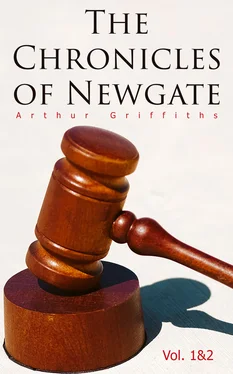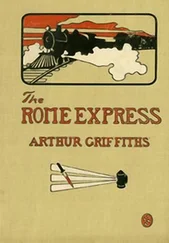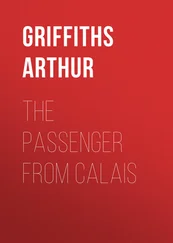Long years elapsed between the building of Newgate and the date when the city gained complete jurisdiction over the prison. King Henry III.’s orders to repair the gaol at his own charge has been mentioned already. Forty years later the same monarch pretended to be keenly concerned in the good government of Newgate. Returning from Bordeaux when his son Edward had married the King of Spain’s sister, Henry had passed through Dover and reached London on St. John’s day. The city sent to congratulate him on his safe arrival, the messengers taking with them a humble offering of one hundred pounds. The avaricious king was dissatisfied, and instead of thanking them, intimated that if they would win his thanks they must enlarge their present; whereupon they gave him “a valuable piece of plate of exquisite workmanship, which pacified him for the present.” But Henry was resolved to squeeze more out of the wealthy burgesses of London. An opportunity soon offered when a clerk convict, one John Frome, or Offrem,[16] charged with murdering a prior, and committed for safe custody to Newgate, escaped therefrom. The murdered man was a cousin of Henry’s queen, and the king, affecting to be gravely displeased at this gross failure in prison administration, summoned the mayor and sheriffs to appear before him and answer the matter. The mayor laid the fault from him to the sheriffs, forasmuch as to them belonged the keeping of all prisoners within the city. The mayor was therefore allowed to return home, but the sheriffs remained prisoners in the Tower “by the space of a month or more”; and yet they excused themselves in that the fault rested chiefly with the bishop’s officers, the latter having, at their lord’s request, sent the prisoner to Newgate, but being still themselves responsible with the bishop for his safe keeping. These excuses did not satisfy the king, who, “according to his usual justice,” says Noorthouck, “demanded of the city, as an atonement of the pretended crime, no less than the sum of three thousand marks.” The fine was not immediately forthcoming, whereupon he degraded both the sheriffs, and until the citizens paid up the enormous sum demanded, he caused the chief of them to be seized and clapped into prison.
The city was ready enough, however, to purchase substantial privileges in hard cash. Many of its early charters were thus obtained from necessitous kings. In this way the Corporation ransomed, so to speak, its ancient freedom and the right of independent government.
In 1327 a further point was gained. The support of the citizens had been freely given to Queen Isabella and her young son in the struggle against Edward II. On the accession of Edward III. a new charter, dated in the first year of his reign, was granted to the city of London. After confirming the ancient liberties, it granted many new privileges; chief among them was the concession that the Mayor of London should be one of the justices for gaol delivery of Newgate, and named in every commission for that purpose. The king’s marshal might in future hold no court within the boundary of the city, nor were citizens to be called upon to plead beyond them for anything done within the liberties. No market might be kept within seven miles of London, while the citizens were permitted to hold fairs and a court of “pye powder” therein; in other words, a court for the summary disposal of all offences committed by hawkers or pedlers, or perambulating merchants, who have les pieds poudrés , or are “dusty-footed.”[17] Other privileges were obtained from the king during his reign. A second charter granted them the bailiwick of Southwark, a village which openly harboured “felons, thieves, and other malefactors,” who committed crimes in the city and fled to Southwark for sanctuary; and a third guaranteed them against the competition of foreign merchants, who were forbidden to sell by retail in the city, to keep any house, or act as broker therein. Again, the election of the mayor was established on a more settled plan, and vested in the mayor and aldermen for the time being. Another charter conceded to the Corporation the honour of having gold and silver maces borne before the chief functionary, who about this period became first entitled to take rank as Lord Mayor. The vast wealth and importance of this great civic dignitary was to be seen in the state he kept up. The Lord Mayor even then dispensed a princely hospitality, and one eminent citizen in this reign, Henry Picard by name, had the honour of entertaining four sovereigns at his table, viz. the kings of England, France, Scotland, and Cyprus, with the Prince of Wales and many more notables. This Picard was one of the Guild of Merchant Vintners of Gascony, a Bordeaux wine merchant, in fact, and a Gascon by birth, although a naturalized subject of the English king. The Vintners gave the city several lord mayors.
Richard II. was not so well disposed towards the city. Recklessly extravagant, wasteful and profuse in his way of living, he was always in straits for cash. The money needed for his frivolous amusements and ostentatious display he wrung from the Corporation by seizing its charters, which were only redeemed by the payment of heavy fines. The sympathies of the city were therefore with Henry Bolingbroke in the struggle which followed. It was able to do him good service by warning him of a plot against his life, and Henry, now upon the throne, to show his gratitude, and “cultivate the good understanding thus commenced with the city, granted it a new charter.” The most important clause of Henry’s charter was that which entrusted the citizens, their heirs and successors, with the custody “as well of the gates of Newgate and Ludgate, as all other gates and posterns in the same city.” The same clause gave them the office of gathering the tolls and customs in Cheap, Billingsgate, and Smithfield there rightfully to be taken and accustomed;[18] “and also the tronage, that is to say, the weighing of lead, wax, pepper, allom, madder, and other like wares, within the said city for ever.” The great concession was, however, in the reign of Edward IV., whose charter was the fullest and most explicit of any previously granted. By this the mayor, recorder, and aldermen who had been Lord Mayor were constituted perpetual justices of the peace of the city; they were also appointed justices of oyer and terminer ; their customs were to be accepted as established beyond controversy by the declaration of the mayor through the recorder; they were exempted from serving as jurors, and so forth, beyond the city. The borough of Southwark was once more clearly placed under the jurisdiction of the city; the citizens were entitled to the goods and chattels of traitors and felons, and the privilege of the annual Southwark Fair, with the pie powder court, was confirmed.
By this time the gate and prison must have passed under the control of the civic authorities. They had, however, already enjoyed the privilege of contributing to its charges. This appears from an entry as far back as September 1339, in the account of expenditure of Thomas de Maryus, chamberlain. The item is for “moneys delivered to William Simond, Sergeant of the Chamber, by precept of the mayor and aldermen, for making the pavement within Newgate, £7 6 s. 8 d. ” How complete became the power and responsibility of the Corporation and its officers is to be seen in the account given in the ‘Liber Albus’ of the procedure when new sheriffs were appointed.[19] They were sworn on appointment, and with them their officers, among whom were the governor of Newgate and his clerk. After dinner on the same day of appointment the old and new sheriffs repaired to Newgate, where the new officials took over all the prisoners “by indenture” made between them and the old.[20] They were also bound to “place one safeguard there at their own peril,” and were forbidden to “let the gaol to fenn or farm.” Other restrictions were placed upon them. It was the sheriffs’ duty also, upon the vigil of St. Michael, on vacating their office, to resign into the hands of the mayor for the time being the keys of Newgate, the Cocket or Seal of Newgate, and all other things pertaining unto the said sheriffwick.[21] All the civic authorities, mayor, sheriffs, aldermen, and their servants, including the gaoler of Newgate, were forbidden to brew for sale, keep an oven, or let carts for hire; “nor shall they be regrators of provisions, or hucksters of ale, or in partnership with such.” Penalties were attached to the breach of these regulations. It was laid down that any who took the oath and afterwards contravened it, or any who would not agree to abide by the ordinance, should be forthwith “ousted from his office for ever.” It was also incumbent upon the sheriffs to put “a man sufficient, and of good repute, to keep the gaol of Newgate in due manner, without taking anything of him for such keeping thereof, by covenant made in private or openly.” Moreover, the gaoler so appointed swore before the Lord Mayor and aldermen that “neither he nor any of them shall take fine or extortionate charge from any prisoner by putting on or taking off his irons, or shall receive moneys extorted from such prisoners.” He was permitted to levy fourpence from each upon release, “as from ancient time has been the usage, but he shall take fees from no person at his entrance there;” indeed, he was warned that if he practised extortion he would be “ousted from his office,” and punished at the discretion of the mayor, aldermen, and common council of the city.
Читать дальше












